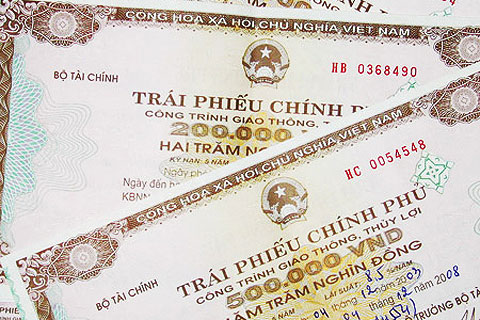Gov’t bides time with international bond issuance
 |
Nguyen Duc Kien, vice head of the National Assembly’s Economic Committee, told VIR that the plan for the government to issue $3 billion in government bonds in the international market was “currently undetermined.”
“We still plan to issue these bonds, but we will do so when the issuance conditions are the most favourable for the country,” he said.
According to him, the National Assembly has green-lighted the issuance, but the government prefers to select the most suitable point of time.
“We will issue the bonds at a time when we receive the cheapest loans with the longest payoff. The speed of disbursement must also suit the economy’s requirements,” Kien said, stressing that the issuance must depend on international financial and monetary developments.
The Ministry of Finance decided to delay the $3-billion international bond issuance plan due to unfavourable international conditions, including the US Treasury bond rise, the devaluation of the Chinese yuan, and the Brexit.
In November 2015, the legislature adopted the plan, slated to kick off sometime in this year, in a bid to to earn money from the issuance to restructure its debts arising during the 2015-16 period.
According to the Central Institute for Economic Management, Vietnam’s debt service volume has been skyrocketing.
Specifically, the government’s direct debts soared from VND185.8 trillion ($8.44 billion) in 2013 to VND296.2 trillion ($13.46 billion) last year. If government-guaranteed and localities’ debts are included, the sum total will be much higher, reaching an expected VND418.4 trillion ($19 billion) for 2015.
The bonds were expected to have terms from ten to 30 years, with interest rates to set depending on the condition of the international capital market at the time of issuance.
National Assembly deputy Tran Hoang Ngan told VIR that the government should exercise great caution in issuing the bonds.
“We must thoroughly study the international financial and monetary market before deciding to make a move,” he said. “Conditions must be very favourable, with the lowest interest rates.”
He also attributed the issuance delay to “global shocks.”
“For example, the FED has been successively increasing interest rates. Thus, if the government conducts the issuance, Vietnam will have to suffer from high lending rates.”
“I think that in the near future we can conduct the issuance with more certainty, as dollar-based lending rates will be more stable, making it more convenient for us.”
Vietnam has issued international bonds three times so far: the first package was released in 2005, worth $750 million; the second in 2010, valued at $1 billion; and the third in 2014, worth $1 billion.
In this year’s first half, the government issued $8.53 billion in bonds, nearly 86 per cent of which have a tenor of five years or more.
The State Treasury will issue another $1.8 billion in government bonds until the end of the year, largely with tenors of over five years.
What the stars mean:
★ Poor ★ ★ Promising ★★★ Good ★★★★ Very good ★★★★★ Exceptional
Latest News
More News
- VinaCapital launches Vietnam's first two strategic-beta ETFs (February 26, 2026 | 09:00)
- PM sets five key tasks to accelerate sci-tech development (February 26, 2026 | 08:00)
- PM outlines new tasks for healthcare sector (February 25, 2026 | 16:00)
- Citi report finds global trade transformed by tariffs and AI (February 25, 2026 | 10:49)
- Vietnam sets ambitious dairy growth targets (February 24, 2026 | 18:00)
- Vietnam, New Zealand seek level-up in ties (February 19, 2026 | 18:06)
- Untapped potential in relations with Indonesia (February 19, 2026 | 17:56)
- German strengths match Vietnamese aspirations (February 19, 2026 | 17:40)
- Vietnam’s pivotal year for advancing sustainability (February 19, 2026 | 08:44)
- Strengthening the core role of industry and trade (February 19, 2026 | 08:35)
















 Mobile Version
Mobile Version